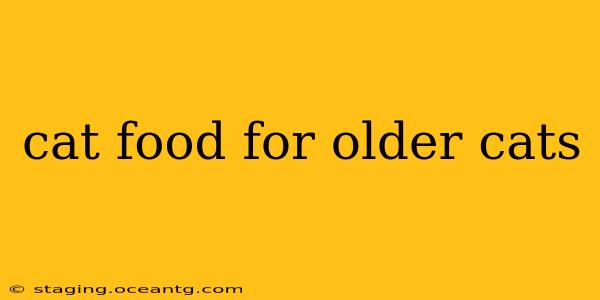As our feline companions age, their nutritional needs change significantly. Choosing the right cat food for older cats is crucial for maintaining their health, vitality, and overall quality of life. This comprehensive guide will explore the key considerations when selecting senior cat food, addressing common concerns and helping you make informed decisions.
What are the Nutritional Needs of Older Cats?
Senior cats, generally considered those over 7 years old (though this can vary by breed and individual health), experience metabolic changes that impact their digestive system, kidney function, and energy levels. Their nutritional requirements shift to focus on:
- Higher protein: Maintaining muscle mass becomes crucial as cats age, and higher protein levels help combat age-related muscle loss (sarcopenia). Look for foods with easily digestible protein sources like chicken, turkey, or fish.
- Moderate fat: While fat is essential for energy and healthy skin and coat, older cats may benefit from slightly lower fat content to avoid weight gain and associated health problems. Choose foods with healthy fats like omega-3 and omega-6 fatty acids.
- Increased fiber: Digestive issues are common in senior cats. Higher fiber content can promote regular bowel movements and improve digestion.
- Reduced carbohydrates: Older cats often have less efficient carbohydrate metabolism. Opt for foods with lower carbohydrate levels.
- Added nutrients: Senior cat food often includes added nutrients like glucosamine and chondroitin to support joint health, taurine for heart health, and antioxidants to support the immune system.
What are the Signs of Poor Nutrition in Older Cats?
Recognizing the signs of nutritional deficiencies is crucial for addressing potential problems promptly. Watch for these indicators:
- Weight loss or gain: Sudden or significant changes in weight are often a warning sign.
- Dull coat: A lackluster coat can indicate insufficient essential fatty acids or other nutritional deficiencies.
- Lethargy and weakness: Decreased energy levels can be a symptom of poor nutrition.
- Changes in appetite: Reduced or increased appetite may signal underlying health problems or nutritional imbalances.
- Digestive issues: Constipation, diarrhea, or vomiting can indicate problems with digestion or food intolerance.
What are the Best Ingredients for Senior Cat Food?
Choosing a senior cat food with high-quality ingredients is paramount. Look for foods featuring:
- Named meat sources: Avoid vague terms like "meat by-products" and opt for specific named meats (e.g., chicken, turkey, salmon).
- Whole grains (in moderation): While carbohydrates should be limited, some whole grains offer fiber and other beneficial nutrients.
- Fruits and vegetables: These provide antioxidants and vitamins.
- Prebiotics and probiotics: These support gut health and improve digestion.
What Type of Cat Food is Best for Senior Cats? (Wet vs. Dry)
Both wet and dry food have their advantages for senior cats:
- Wet food: Often more palatable and higher in moisture content, which is beneficial for hydration, especially for cats with kidney issues. However, it can be more expensive.
- Dry food: Convenient, affordable, and helps with dental health by scraping plaque from teeth. However, it's generally lower in moisture content. Many senior cats benefit from a combination of wet and dry food.
How Often Should I Feed My Older Cat?
Feeding frequency depends on your cat's individual needs, activity level, and the type of food you are feeding. Consult your veterinarian for personalized recommendations. Generally, smaller, more frequent meals are often better for senior cats, preventing digestive upset.
What Should I Avoid in Senior Cat Food?
Avoid foods with:
- Artificial colors, flavors, and preservatives: These can contribute to allergies and other health problems.
- High levels of fillers: These provide little nutritional value.
- By-products: These are lower-quality ingredients with minimal nutritional benefits.
My Cat is a Picky Eater - How Can I Get Them to Eat Senior Food?
Transitioning to senior food gradually can help improve acceptance. Start by mixing a small amount of the new food with their current food and slowly increase the proportion over several days or weeks. Consider warming the food slightly to enhance its aroma. If your cat remains uninterested, consult your veterinarian to rule out underlying health conditions.
Does My Older Cat Need Special Dietary Considerations Based on Pre-Existing Health Conditions?
Absolutely. Cats with kidney disease, diabetes, or other health issues often require specialized diets formulated to meet their unique nutritional needs. Your veterinarian can recommend a suitable diet based on your cat's condition. Always consult your veterinarian before making significant changes to your cat's diet.
By carefully considering your senior cat's individual needs and following these guidelines, you can help ensure they receive the optimal nutrition to live a long, healthy, and happy life. Remember to always consult your veterinarian for personalized advice and to monitor your cat's health closely.
